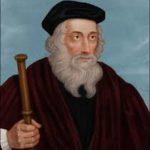John Wycliffe (John Wyclif) - On Civil Dominion

The year 1377:
https://www.5minutesinchurchhistory.com/1377-2/
https://www.goodreads.com/book/show/39891235-john-wycliffe
From https://plato.stanford.edu/entries/wyclif/
“John Wyclif was born near Richmond (Yorkshire) before 1330 and ordained in 1351. He spent the greater part of his life in the schools at Oxford: he was fellow of Merton in 1356, master of arts at Balliol in 1360, and doctor of divinity in 1372. He definitely left Oxford in 1381 for Lutterworth (Leicestershire), where he died on 31 December, 1384. It was not until 1374 (when he went on a diplomatic mission to Bruges) that Wyclif entered the royal service, but his connection with John of Gaunt, Duke of Lancaster, probably dates back to 1371. His ideas on lordship and church wealth, expressed in De civili dominio (On Civil Dominion), caused his first official condemnation in 1377 by the Pope (Gregory XI), who censured nineteen articles. As has been pointed out (Leff 1967), in 1377–78 Wyclif made a swift progression from unqualified fundamentalism to a heretical view of the Church and its Sacraments. He clearly claimed the supremacy of the king over the priesthood (see for instance his De ecclesia [On the Church], between early 1378 and early 1379), and the simultaneous presence in the Eucharist of the substance of the bread and the body of Christ (De eucharistia [On the Eucharist], and De apostasia [On Apostasy], both ca. 1380). His theses would influence Jan Hus and Jerome of Prague in the 15th century. So long as he limited his attack to abuses and the wealth of the Church, he could rely on the support of a (more or less extended) part of the clergy and aristocracy, but once he dismissed the traditional doctrine of transubstantiation, his (unorthodox) theses could not be defended any more. Thus in 1382 Archbishop Courtenay had twenty-four propositions that were attributed to Wyclif condemned by a council of theologians, and could force Wyclif’s followers at Oxford University to retract their views or flee. The Council of Constance (1414–18) condemned Wyclif’s writings and ordered his books burned and his body removed from consecrated ground. This last order, confirmed by Pope Martin V, was carried out in 1428.”
“Wyclif defines dominion as the right to exercise authority and, indirectly, to hold property. According to him, there are three kinds of possession: natural, civil, and evangelical. Natural possession is the simple possession of goods without any legal title. Civil possession is the possession of goods on the basis of some civil law. Evangelical possession requires, beyond civil possession, a state of grace in the legal owner. Thus God alone can confer evangelical possession (ibid., p. 45). On the other hand, a man in a state of grace is lord of the visible universe, but on the condition that he shares his lordship with all the other men who are in a state of grace, as all men in a state of grace have the same rights. This ultimately means that all the goods of God should be in common, just as they were before the Fall. Private property was introduced as a result of sin. From this point of view it is also evident that Aristotle’s criticisms against Plato are unsound, since Platonic communism is correct in essence (ibid., pp. 96 ff.). The purpose of civil law is to preserve the necessities of life (ibid., pp. 128–29). The best form of government is monarchy. Kings must be obeyed and have taxes paid to them, even if they become tyrants, since they are God’s vicars that He alone can depose — so that only secular lordship is justified in the world (ibid., p. 201).”
1958 6. John Wyclif 's Divine Dominion and the End of the Middle Ages
https://cupola.gettysburg.edu/cgi/viewcontent.cgi?article=1005&context=c...
cute little timeline:
https://cat.xula.edu/tpr/timelines/wycliffe/
Nice final entry: "John Wycliffe's bones are exhumed and burned according to papal command."
https://www.therestorationmovement.com/lessons/12,07,2020pres.pptx